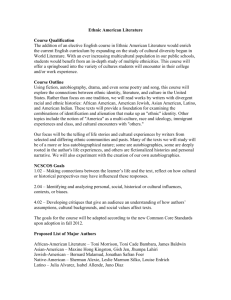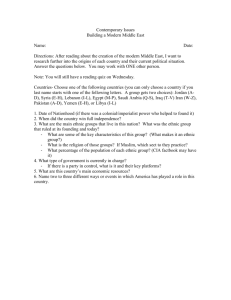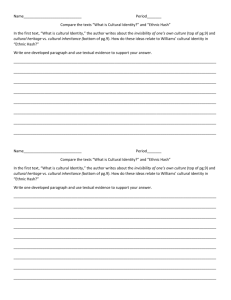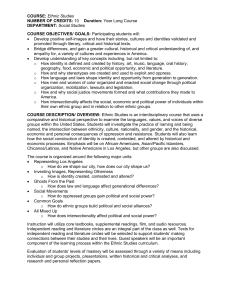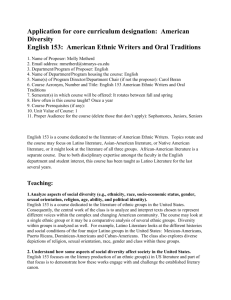Introduction - Wolfweb Websites
advertisement
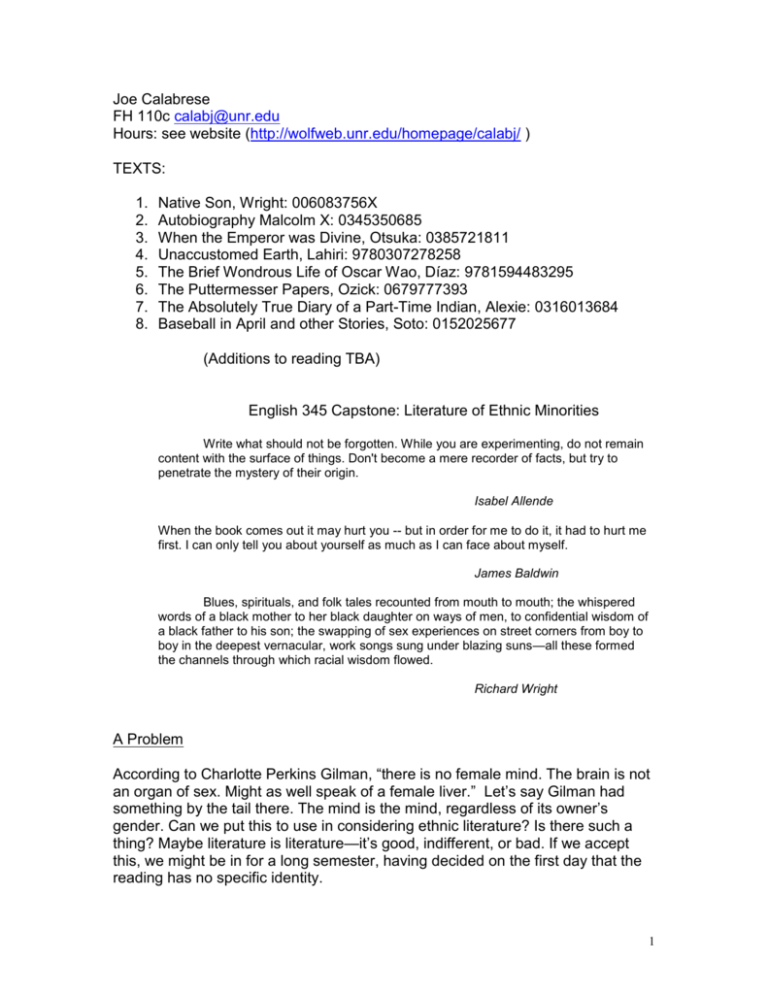
Joe Calabrese FH 110c calabj@unr.edu Hours: see website (http://wolfweb.unr.edu/homepage/calabj/ ) TEXTS: 1. 2. 3. 4. 5. 6. 7. 8. Native Son, Wright: 006083756X Autobiography Malcolm X: 0345350685 When the Emperor was Divine, Otsuka: 0385721811 Unaccustomed Earth, Lahiri: 9780307278258 The Brief Wondrous Life of Oscar Wao, Díaz: 9781594483295 The Puttermesser Papers, Ozick: 0679777393 The Absolutely True Diary of a Part-Time Indian, Alexie: 0316013684 Baseball in April and other Stories, Soto: 0152025677 (Additions to reading TBA) English 345 Capstone: Literature of Ethnic Minorities Write what should not be forgotten. While you are experimenting, do not remain content with the surface of things. Don't become a mere recorder of facts, but try to penetrate the mystery of their origin. Isabel Allende When the book comes out it may hurt you -- but in order for me to do it, it had to hurt me first. I can only tell you about yourself as much as I can face about myself. James Baldwin Blues, spirituals, and folk tales recounted from mouth to mouth; the whispered words of a black mother to her black daughter on ways of men, to confidential wisdom of a black father to his son; the swapping of sex experiences on street corners from boy to boy in the deepest vernacular, work songs sung under blazing suns—all these formed the channels through which racial wisdom flowed. Richard Wright A Problem According to Charlotte Perkins Gilman, “there is no female mind. The brain is not an organ of sex. Might as well speak of a female liver.” Let’s say Gilman had something by the tail there. The mind is the mind, regardless of its owner’s gender. Can we put this to use in considering ethnic literature? Is there such a thing? Maybe literature is literature—it’s good, indifferent, or bad. If we accept this, we might be in for a long semester, having decided on the first day that the reading has no specific identity. 1 If we claim that ethic literature is an actual category, a host of questions arise, the key one being what defines this category. As we try to answer, someone might wonder if French or Spanish or Persian writing includes an ethnic branch. This leads someone else to wonder if ethnic writing always occupies a place within a sub-culture. Arguments about status might quickly follow. Maybe we should return to the search for a definitive trait, a key to identifying literature as ethnic, and we really have to undertake the search since the term “ethnic literature” defines our course of study. Here are several approaches: a. It’s whatever ethnic writers produce. b. It’s literature about ethnic groups c. It’s a and b: writing by and about ethnic groups To take them in turn, (a) has no reference to content, and it also categorizes the work before the author puts pen to page. (b) is so broad that a screed like “Almond Eyes,” which is about Chinese in America, gets included even though a white person wrote it as an attack on Chinese living in the U.S. (c) nails two features together, and in the process repeats the problems of (a) and (b). Alternatively, we might look at the epigraphs above. Putting aside genre questions, we can consider these briefly. Allende wants writers to penetrate surfaces. That applies to readers, too. If the writer sees into the world, not merely across its appearances, we can read the inner world of each tale. Why? What can we expect there? Baldwin suggests that his work tells us about us, that in facing himself he sees us as well. That claim really matters in literature that seems to be about “others,” minorities living at some remove from a majority culture. In short, these readings offer a route toward an ancient ideal: know yourself. Wright refers to “racial wisdom,” a problematic term which suggests, for me, something at once collective and isolated. Can I, coming from a different cultural background, grasp anything of this wisdom? If the answer is no, the course is wasted, so I’m going with the affirmative. Reading about a young Indian woman from a past century tells us about ourselves. The struggle of a Japanese American family imprisoned without trial somehow illuminates the universal struggle for a sense of identity. Even the story of a monstrous character like Bigger Thomas offers us something of value. These stories help me to imagine the humanity of characters far removed from my immediate world. Like all literature, these stories offer a wider experience of the world. We can defer more elaborate answers until we’ve read our texts. I’m inclined to do that. With 8 or so texts to consider, we might actually identify recurrent themes such as the quality of lives positioned according to race, or white supremacy as a cultural standard, or the struggle to “blend in” while preserving a heritage. If we delay an answer, we might also read texts openly, 2 letting them say what they will, with little interference from expectations about our category. Coursework (read carefully) 90% of your grade depends on your writing. We will do several short papers focused on texts under discussion and one final paper with a bit more latitude so that you can pursue an approach that draws on your particular studies at UNR. For this to work, you will have to make a proposal and discuss it with me. Grade breakdown: Short Papers: 75% Final Paper: 15% Participation: 10% 1 NOTE: If you fail to do even one paper, you earn an F in the course. Policies in general See the website, under policies, for details. You are responsible for knowing these things. I will allow any student three absences, no excuse needed, and no ill effect on your grade. Beyond that, I reserve the right to lower your grade—all the way down. Nobody who whines or derides texts or classmates will do well here. But you know that. If you need particular accommodations, tell me and I’ll work with you. Other Policies Late essays may be accepted. I’m not inflexible but be careful. If you miss a class, find out from a classmate what we did. Do not ask me. Do not email me essays or other class work without prior permission. Feel free to use my office hours whenever you want to talk about the class. If posted hours don’t work for you, I’ll schedule a time that does. Read the policy page on the class website: www.unr.edu/homepage/calabj Enjoy the class. Take responsibility for that. The homepage for 345 is http://wolfweb.unr.edu/homepage/calabj/345/345homepage.html Check it for the reading schedule and for paper prompts and any additional readings I may assign. We’ll talk about format for these discussions early in the semester, and we’ll adjust the format as needed. 1 3

